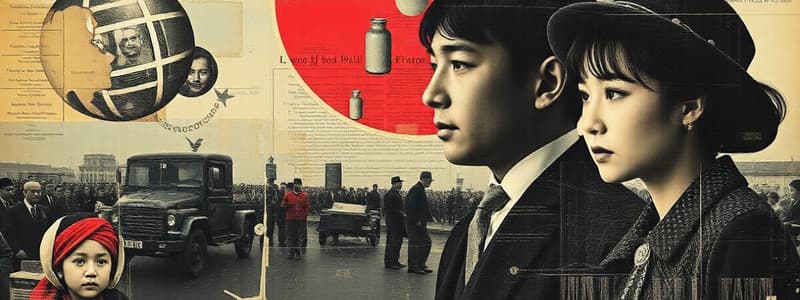Podcast
Questions and Answers
What is the main difference between a migrant and a refugee?
What is the main difference between a migrant and a refugee?
- Migrants move for opportunities, while refugees are forced to leave due to danger. (correct)
- Migrants and refugees are the same, just with different terms.
- Migrants are always seeking asylum, while refugees are not.
- Migrants leave for safety, while refugees move for economic reasons.
Which legislation specifically limited citizenship rights in the U.S. based on race?
Which legislation specifically limited citizenship rights in the U.S. based on race?
- 1790 Naturalization Act (correct)
- 14th Amendment
- Chinese Exclusion Act
- Immigration and Nationality Act
What does the term 'tokenism' refer to in media representation?
What does the term 'tokenism' refer to in media representation?
- The practice of adding one individual of color to create an illusion of diversity. (correct)
- The promotion of positive stereotypes through media.
- The genuine inclusion of diverse voices in media.
- A method of highlighting only minority opinions in media.
What is a counter stereotype?
What is a counter stereotype?
What is the significance of the 'Danger of a Single Story' concept?
What is the significance of the 'Danger of a Single Story' concept?
Flashcards
Immigrant
Immigrant
A person who moves to a new country to live.
Refugee
Refugee
A person forced to leave their country due to danger or war.
Push/Pull Factors
Push/Pull Factors
Reasons people leave (push) or come to (pull) a place.
14th Amendment
14th Amendment
Signup and view all the flashcards
Media
Media
Signup and view all the flashcards
Study Notes
Migration and Citizenship
- Migration is moving from one place to another.
- Migrants move for opportunities.
- Refugees are forced to leave due to danger.
- Asylum seekers are asking for safety in another country.
- Immigrants move into a new country.
- Emigrants leave their country.
- Push and pull factors are reasons people leave or come to a place.
Historical Citizenship Restrictions
- The 1790 Naturalization Act limited citizenship to white people.
- The 14th Amendment granted citizenship to everyone born in the U.S.
- The Chinese Exclusion Act banned Chinese immigration.
Media and Representation
- Media includes news, TV, and social media.
- Tokenism is when diversity is fake, like adding only one person of color to seem inclusive.
- Implicit bias are hidden stereotypes.
- Counter-stereotypes are positive ways to challenge stereotypes.
- The "Danger of a Single Story" is a TED Talk about the limitations of stereotypes.
- Diversity in media is important to include all voices.
Studying That Suits You
Use AI to generate personalized quizzes and flashcards to suit your learning preferences.




